Alexander Van der Bellen, who campaigned on moderation and tolerance, won Austria’s presidential election. But in the search for explanations as to how the country came close to electing a far-right populist as its president, some have suggested that support for Norbert Hofer was driven in part by the 2015 refugee crisis, during which more than 85,000 asylum claims were lodged in Austria.
Whatever the merits of that argument, there is no doubt that rising support for populist parties is the elephant in the room for much of Europe’s asylum debate. If Europe doesn’t keep its borders closed, the argument goes, voters will abandon mainstream parties for those willing to do whatever it takes to keep migrants out.
Earlier this year, Foreign Affairs Minister Sebastian Kurz called for the EU to adopt “parts of the Australian model,” including offshore detention and processing, boat pushbacks, and Australia’s policy that irregular entry precludes an asylum application. Some Danish politicians have expressed similar interest.
The Australian approach is no model for Europe.
To start with, Australia’s arrangements with Nauru and Papua New Guinea are costly. The Australian government hasn’t regularly released detailed accounts of its expenditures on the offshore facilities, but it’s clear from the numbers it has provided that the price tag is something on the order of €240,000 per person per year. That figure doesn’t include the cost of the Coast Guard’s interdiction operations, the payouts the Australian government may have made to smugglers to turn boats back to Indonesia, and the €38 million it is known to have paid Cambodia to accept a handful of refugees from Nauru.
What’s more, these offshore arrangements are only temporary. Nauru has said it expects the refugees it holds to move elsewhere at some point. Papua New Guinea’s government has conceded, in response to a ruling by that country’s supreme court, that its Manus Island facility must be closed as soon as possible.
And the human toll is enormous, and has rightly brought Australia condemnation.
As I’ve seen and heard from children and adults held on the tiny Pacific island nation of Nauru and on Manus Island in Papua New Guinea, Australia’s offshore operations cause real and lasting harm. Forcible transfer and exile to remote locations and uncertainty about their fate have had dire consequences for the mental well-being of refugees and asylum seekers.
Nearly everybody I interviewed on Nauru described high levels of anxiety, trouble sleeping, mood swings, and feelings of listlessness and despondency that began when they were forcibly transferred to the island. Children had begun to wet their beds, suffer nightmares, act out, and in some instances had stopped interacting with or even speaking to people outside of their immediate families.
A leaked report from the United Nations High Commissioner for Refugees (UNHCR) found that post-traumatic stress disorder and depression “have reached epidemic proportions” among those held in both locations and “anticipate[d] that mental illness, distress and suicide will continue to escalate in the immediate and foreseeable future.”
EU countries will face all these challenges, and more, if they try to copy the misguided Australian approach. The migration flows Europe faces are several orders of magnitude greater than those to Australia, which had peak boat arrivals of just over 20,000 in 2013.
Austria and other EU countries should instead adopt a different path, one that increases safe and legal channels into the EU for refugees and confronts the systematic shortcomings with the European asylum framework and the divergent ways that individual member states implement it.
The EU should end its efforts to outsource responsibility for refugees and asylum seekers to outside countries —the opportunistic, flawed deal with Turkey and problematic cooperation with Libyan authorities—and replace them with initiatives to improve conditions for refugees in Jordan, Lebanon, Turkey, and elsewhere.
Access to work and education for refugees in those countries would make an enormous and immediate difference. EU support, diplomatic and financial, can help that happen.
It’s not easy to quantify the dividends that such an approach would yield, but it’s not a stretch to conclude that it’s a better investment than the billions Australia has spent on its offshore operations.
One could hope that Austria and other EU countries would adopt these policies out of a genuine sense of responsibility in the midst of an unprecedented global displacement crisis, adherence to the human rights values at the core of the EU, and a vision of thriving, pluralistic and tolerant societies.
But even those who question these values will find ample reason to conclude that Australia’s approach is unfit for purpose.










